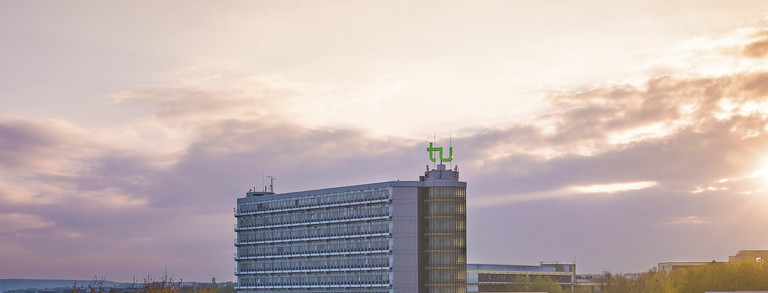Three Questions for Assistant Professor Jinjin Ha
- Top News
- Research

Prof. Jinjin Ha is conducting a research project at the Institute of Forming Technology and Lightweight Components (IUL) headed by Prof. A. Erman Tekkaya. The assistant professor from the University of New Hampshire (UNH) specializes in material mechanics for metal deformation processes. She has received an Alexander von Humboldt Fellowship for experienced researchers, which enables her to carry out her research stay at the institute for several months at a time, alongside her work in the United States. In this interview, Prof. Ha talks about the goals of her research project and the collaborative effort for innovating manufacturing through research.
Prof. Ha, what are you currently researching?
My research project at IUL tackles the stress superposition effect, meaning the addition of secondary stresses, in incremental sheet forming. Incremental forming is a flexible sheet forming process that does not require traditional big scale machines and equipment. Instead, one or multiple moving tools form the sheet into the desired shape while grips are holding the blank in place. I want to improve and further develop the incremental forming process using the stress superposition effect so that it is viable for important future applications in the aerospace industry or for medical products, like trauma implants. The first goal of my research project is to produce a fully formed sheet with locally adjusted mechanical properties by manipulating the microstructure changes induced by the deformation. The second goal is to reduce springback, which occurs when we remove the formed sheet from the grips after the forming process is completed. The residual stress from the forming process causes the shape to warp. Using constitutive modeling combined with data from experiments on the material characterization, I want to investigate the mechanism behind stress superposition as a solution for springback.
Why is it important to combine simulations and physical experiments?
Computer simulations are resource-efficient and allow us to gain a better understanding of the mechanics and material deformation behavior during the incremental forming process with stress superposition. Only when we understand the fundamentals, we can expand our knowledge to help us find innovative solutions. This is why recent research efforts have emphasized simulations and computation skills more and more. For this purpose, we need reliable and highly accurate prediction results from the simulations. With constitutive modeling, we can improve the accuracy of our predictions. Furthermore, we have to validate the predictions thoroughly by comparing them with the results from physical experiments. Since 2021, we have been collaborating on this topic at IUL and UNH – for example through the exchange of students from both countries – and have been collecting experimental data on material characterization and incremental forming, as well as the resulting residual stress and microstructure changes. The combination of constitutive modeling and the data from physical experiments helps us to better understand and control local deformation in incremental forming, and thus to influence the conditions that cause springback.
What makes this international research collaboration so valuable?
Advanced manufacturing, the transfer of science and technology into the manufacturing process, is currently receiving a lot of attention. According to the US National Institute of Standards and Technology, the manufacturing sector has contributed more than ten percent of the gross domestic product (GDP) in the United States. Industrial manufacturing also comprises a large share of the German GDP. Thus, there is an increased common interest in innovation and the development of new processes. My project is part of a continuous research effort that connects IUL and UNH. In 2021, one of my PhD students conducted research at IUL on different springback solutions using the stress superposition effect in incremental forming, funded by research fellowships from the Fulbright Program and the Graduate International Research Experiences Program (IIE-GIRE NSF). In exchange, an undergraduate student from TU Dortmund University was able to stay with my team at UNH with support from the German Academic Exchange Service (DAAD) to conduct incremental forming experiments on cyclic bending with tension. Together, we can contribute to the comprehensive understanding and innovation of manufacturing processes.
In addition, international cooperation is always a highlight and a great experience, both for researchers as well as for students, so I also want to create opportunities for my students to go abroad. During my stay, I hope to strengthen the collaboration with IUL even further and to expand my network in Germany!
Vita
Prof. Jinjin Ha received her doctoral degree from Pohang University of Science and Technology (POSTECH) in South Korea in 2016. Subsequently, she conducted post-doctoral research at the University of New Hampshire (UNH) and the Ohio State University (OSU). Since 2020, she is an assistant professor in the Department of Mechanical Engineering at UNH.
About the Humboldt Research Fellowship
Awarded by the Alexander von Humboldt Foundation, the Research Fellowship enables experienced international researchers with above-average qualifications to conduct their own project in collaboration with a host at a German research institution. The fellowship addresses postdocs and experienced researchers who have completed their doctoral degree during the last twelve years.




![[Translate to English:] Partner Four hands are holding the green logo of TU Dortmund University](/storages/tu_website/_processed_/1/d/csm_Partner_Nicole_Rechmann_KW_40b35bb3fd.jpg)




![[Translate to English:] Forschung An apparatus with tubes in a laboratory](/storages/tu_website/_processed_/0/c/csm_Forschung_Juergen_Huhn_cbd34afd6d.jpg)
![[Translate to English:] Studium Five students are sitting in a lecture hall. They are talking to each other.](/storages/tu_website/_processed_/c/9/csm_Studium_FelixSchmale_81d94adc86.jpg)





